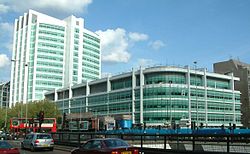History
In 1826, the London University began emphasising the importance of having medical schools attached to hospitals. Before the hospital opened, only Oxford and Cambridge universities offered medical degrees, and as a consequence relatively few doctors actually had degrees. [2] The hospital was founded as the North London Hospital in 1834 in order to provide clinical training for the "medical classes" of the university, after a refusal by the governors of the Middlesex Hospital to allow students access to that hospital's wards. [3] It soon became known as University College Hospital. [3]
In 1835, Robert Liston became the first professor of clinical surgery at UCH, [4] [5] and the first major operation under ether in Europe was conducted at the hospital by Liston on 21 December 1846. [3] UCH was split from UCL in 1905, and a new hospital building designed by Alfred Waterhouse, known as the Cruciform Building, was opened in 1906 on Gower Street. UCH merged with the National Dental Hospital in 1914, and the Royal Ear Hospital in 1920. [3]
George Orwell married Sonia Brownell in 1949, and later died 21 January 1950, in room 65 of the hospital. [6] The hospital was run by the Camden and Islington Area Health Authority [7] from 1974. In 1994, UCH became part of the University College London Hospitals NHS Trust. [3] The hospital site at the Cruciform Building was closed in 1995, despite strikes and an occupation in 1993. [8] The building was purchased by UCL, for use as the home for the Wolfson Institute for Biomedical Research and the teaching facility for UCL bioscience and medical students UCL Medical School. [9]
A new 75,822 m2 hospital, procured under the Private Finance Initiative in 2000, designed by Llewelyn Davies Yeang [10] and built by a joint venture of AMEC and Balfour Beatty at a cost of £422 million, opened in 2005. [11] [12] The sculpture Monolith and Shadow made from a large polished piece of Brazilian granite was placed outside the main entrance to the new hospital in 2005. [13]
In October 2006, the hospital was nominated and made the Building Design shortlist for the inaugural Carbuncle Cup, awarded to "the ugliest building in the United Kingdom completed in the last 12 months", [14] which was ultimately awarded to Drake Circus Shopping Centre in Plymouth. [15] Facilities management services are provided by Interserve. [1]
In November 2008, the £70 million Elizabeth Garrett Anderson Wing was opened, allowing the hospital to offer all women's health services in one place (except some breast and gynaecology services). [16]
In 2024, King Charles III became patron of the hospital, a role Queen Elizabeth II had filled until her death in 2022. [17]
This page is based on this
Wikipedia article Text is available under the
CC BY-SA 4.0 license; additional terms may apply.
Images, videos and audio are available under their respective licenses.



